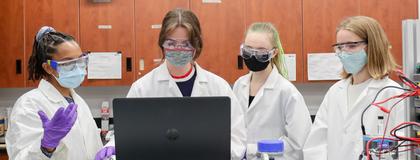
Microbiology Co-op Student Information
About The Program
Microscopic organisms, including bacteria, yeast, mould and viruses, are the most abundant forms of life on earth. These organisms play vital roles in our ecosystems as well as within the human body. In the Microbiology program, you will come to learn about the complex interaction of these organisms such that some microorganisms cause disease while others produce antibiotics that remedy disease. At Guelph, an in-depth understanding of the role of microbiology in industrial processes, the production of food, environmental issues and in biological and medical research, provides students with a complete education and an option to specialize in an area of emphasis.
Why Co-op?
As a co-op student, you will gain relevant work experience, build professional networks, and develop essential interpersonal skills needed to succeed in the workplace, all while getting paid and earning your university degree. Guelph’s co-op program is unique due to the exceptional level of support provided throughout the co-op experience. Students will complete a comprehensive course preparing them for the co-op employment process, and will receive guidance from a knowledgeable team of staff dedicated to their development and success.
Course Sequencing
| YEAR | FALL | WINTER | SUMMER |
|---|---|---|---|
| ONE | Academic | Academic | Off |
| TWO | Academic | Academic | Work |
| THREE | Academic | Academic | Work |
| FOUR | Work | Work | Academic |
| FIVE | Academic | Academic |
Acquired Knowledge & Skills
Knowledge
Strong knowledge of various areas of Microbiology including Industrial and Food, Environmental, Molecular and Pathogenic.
Application
Well-developed analytical expertise from the completion of extensive research projects.
Communication
Excellent communication skills developed through oral presentations and report writing.
Collaboration
Ability to work well alongside a team.
Sample Jobs
There is a diverse selection of jobs made available to Microbiology Co-op students, in government, academia, and the private sector within various industries. You may conduct research, work in public health in a clinical setting, assist in data collection and analysis, or may formulate, prepare, and analyze food samples. Students may work in a laboratory, a hospital, on a production or manufacturing floor, and/or in an office setting. Below are some examples of past positions held by Microbiology co-op students:
Associate Analyst
In this role, you will assist with the testing of in-process and finished products by conducting sample analyses, maintaining up-to-date records of all work, carrying out special projects related to manufacturing, and maintaining the laboratory equipment.
Quality Assurance Technician
In this role, you will perform tasks to ensure that technical activities and production are in compliance with Organizational Quality Assurance Specifications and HACCP/Food Safety Standards. Some of these tasks include performing quality inspections, conducting specific testing, and inspecting work in process.
Co-op Student - Vaccines
While working in the Vaccine Preventable Bacterial Diseases Department, you will be involved in a laboratory investigation of phenotypic, genetic and immunochemical characterization of bacterial isolates. As part of this dynamic team, you will be required to assist in the testing and documentation of all lab tests.
Additional Sample Jobs: Production Support Analyst, Quality Control Assistant, Molecular Biology Researcher, Food Safety Inspector, and more.
Sample Employers*
- Public Health Agency of Canada
- Septodont
- Saputo Dairy Products
- Pioneer Hi-bred
*This shows a sample of recent co-op employers and will vary depending on employer recruitment needs. During a job search, students are encouraged to be actively engaged and are supported in establishing and maintaining their own personal contacts.
Salary Information
Students receive compensation from their employer for co-op work terms. The rate of pay will vary depending on a number of factors including the industry, the student’s program of study, and work term level. For your reference, a Co-operative Education Salary Guide is available on our website, which provides hourly rates (averages and ranges) for each degree program.
